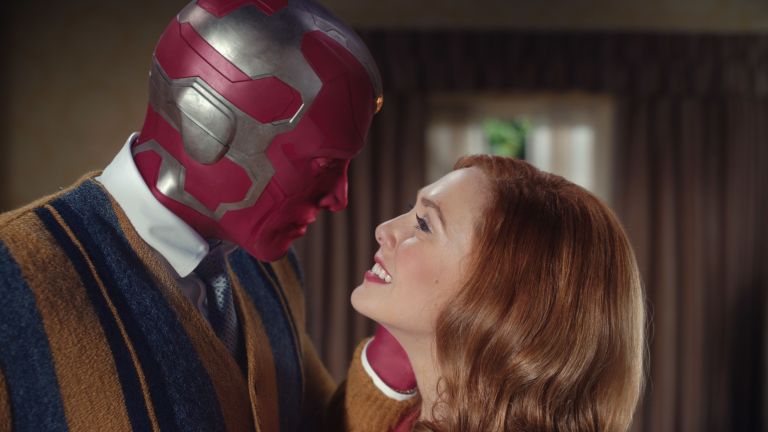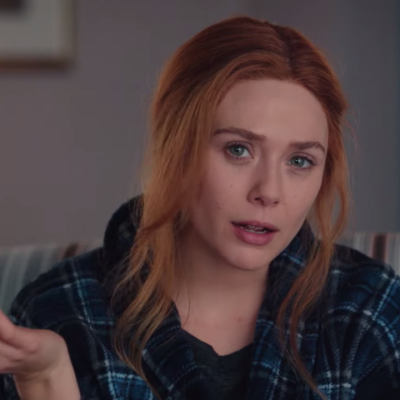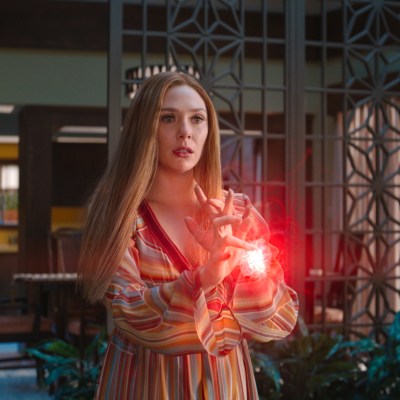How WandaVision Proves Marvel Can Tell a Love Story That Matters
By putting Wanda and Vision's romance center stage, WandaVision proves that the Marvel Universe has space for love stories too.

This article contains Wandavision spoilers.
The pages of Marvel Comics include some of the most iconic romantic relationships in pop culture, but looking at the feature films that comprise the Marvel Cinematic Universe, you’d be forgiven for not really knowing that fact. These twenty-some-odd movies have given us everything from space operas and magic to war dramas and spy films. Yet, in all this time, we’ve never really gotten a love story, and certainly not a film in which the central romantic relationship was the primary driving force behind its narrative. Until now.
WandaVision is not just the MCU’s first proper romance, it’s the first time this franchise has gone all-in on the idea that love can be as cosmic and all-encompassing as every other tale this universe tells and should be treated as such. The story of Wanda and Vision is both thrilling and heartbreaking by turns, but it’s not because of Wanda’s magic or the charming sitcom framework the couple finds themselves in. It’s because this is a story that, at its heart, is simply deeply, achingly romantic, grounded in the connection between two outsiders bound by tragedy, loss, and the warm, fuzzy tropes of TV comedies.
As a franchise, the MCU has often struggled with how best to depict romance, often featuring barely-there relationships that generally culminated in a single, sweeping kiss but involved few real problems or indications of how such a connection might function long-term. Onscreen flirting in the MCU is primarily comprised of snarky verbal sparring that is the conversational equivalent of a boy pulling a girl’s pigtail on the playground. Even the films’ most central couples – Steve Rogers and Peggy Carter, Tony Stark and Pepper Potts – share little more than a handful of scenes and are never really treated as a narrative priority beyond the ways the existence of their feelings for these women motivate and impact both men.
When it comes to onscreen romances, viewers are often left having to fill in the details of these relationships themselves, through narrative gaps that may span both years and multiple sequels within the larger franchise. Wanda and Vision’s relationship is one of the linchpins around which the plot of Avengers: Infinity War turns, yet their initial courtship happened entirely offscreen, leaving fans to wonder how the two came to care about one another so deeply that it made risking half of humanity not just okay, but necessary.
Though the relationship between Vision and the Scarlet Witch is one of the most famous in comics, in the cinematic universe it was essentially treated as an afterthought, a legacy pairing that existed more for storytelling purposes than because of anything to do with these specific versions of these characters. In fact, both Wanda and Vision were woefully underdeveloped onscreen, with the film universe often counting on fans’ knowledge of the pair’s long comics history to paper over a lot of gaps in their narrative and endow their relationship with an emotional heft it had not otherwise earned.
All of that changes in WandaVision and, as a result, it feels as though we are truly seeing Vision and the Scarlet Witch for the first time.
The series’ endearing remix of classic sitcom tropes and low-stakes adventures that involve everything from a town talent show to a new family pet (RIP, Sparky) allows us to see Wanda and Vision’s love in a whole new light. Their banter is adorable and the easy chemistry between them is glaringly apparent in a way that we haven’t ever had the chance to see before onscreen. (Possibly because the pair had shared maybe a dozen scenes together in the films.)
And where the MCU films have been relatively sexless thus far, WandaVision is unafraid to show us a couple who has a genuine passion for one another. From Vision’s reaction to Wanda’s ‘50s style lingerie to Wanda’s magical fusing of their separate beds and the repeated subtle jokes about the fact that both parties enjoy costumes, this is clearly a duo that is extremely physically into each other. Their sex scenes are implied, but that’s not exactly a huge surprise – this is Disney’s house after all, and the classic sitcoms this series takes its inspiration from often also had to rely on sly innuendo meant to skirt around the broadcasting standards of their time.
But the breadth of Wanda and Vision’s love is also felt in the absence of it. Wanda’s grief, so raw and immediate in the aftermath of Vision’s Infinity War death – that she had to witness twice and which, for her, just happened a month ago – is powerful enough to warp reality and create the town, home, and husband of her dreams from little more than memory and hope. The idea of living her life without that love is nigh unbearable for her, so she…doesn’t.
“But what is grief, if not love persevering?” Vision asks Wanda in a flashback sequence that really should have appeared in Captain America: Civil War. The existence of this Westview is a form of Wanda’s love persevering, in a heartbreaking and tragic way. And that’s what makes her behavior so understandable and easy to sympathize with, even as she robs an entire town of its free will and tries to make up for it by providing them with picture-perfect lives in exchange. She’s doing it for the chance to hold onto that love a little longer, and her grief and depression are both lenses through which her actions must be viewed.
Unlike the big-screen films, which often involve massive stakes and potentially world-ending problems, WandaVision is a story about love – our desire for it, our joy in it, and the way we are left bereft in its absence. Wanda may be one of the most powerful beings in the cosmos, but all she wants is a home with the man she loves and a normal life full of everyday problems and misadventures.
And for the first time, the MCU has a relationship that feels like it means something, from an emotional perspective, as a focus of the larger story about grief and trauma that WandaVision is telling, and as a piece of the larger onscreen universe. Wanda will next appear in Doctor Strange in the Multiverse of Madness and it’s difficult to imagine the fallout from whatever happens to Westview – and Vision – won’t be felt there. But whatever happens to Wanda in that film, those events will carry a lot more emotional impact because we finally got to see the truth of what most mattered to her – the love she had and lost along the way.
And as we look to the future of the Marvel universe, WandaVision provides a valuable model for the films and series to come. If Doctor Strange in the Multiverse of Madness wants us to care about Strange’s budding relationship with Dr. Christine Palmer, then it needs to treat her as a fully formed character who exists outside of her role as his ex. And if Guardians of the Galaxy Vol. 3 expects us to root for Peter Quill to somehow reconcile with a Gamora who considers him a stranger, then the film is going to have to put in the work to make that reconnection a believable one, starting with acknowledging that both this character and their relationship are necessarily different from the versions we remember. It’s true, not every film necessarily needs a romance at its center – and Captain Marvel was certainly just fine without one – but they can and do remind us why we tell these stories in the first place. What are we saving the world for, after all – if not the people we love?


